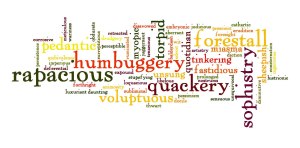by Gabby Redpath
We begin learning new vocabulary as soon as we enter the world. We learn the basics of the English language in the beginning years of life, but how much more do we need to know? Vocabulary lists are a key part of our education, but how many do we really need?
Don’t get me wrong, I see the importance of a wide vocabulary. Higher level writing and speech require a certain level of knowledge of the English language. In the world outside of education, a thesaurus won’t always be available. In the business world we may see words like tangent or absolution, but when will we see laceration or lachrymose?
I find myself studying words for tests instead of studying words for real life. I’m spending my time repeating respite until it’s committed to memory, later to forget its meaning. I, like most other teens, place my vocabulary words and definitions in short term memory. I only need to know the words for the test; so why spend the time committing them to long term memory?
“Honestly, I don’t remember a single vocabulary word I’ve ever had.” said Junior Emily Jerez as she thought back on all of the words she’s learned but never used.
If teachers want us to really expand our vocabularies, they should give us words we really could apply to our lives. If we saw our work paying off in the real world maybe we would work harder. Vocabulary words we could use outside the classroom setting would benefit us far more than the typical SAT vocabulary we see today. I am far more likely to remember the meaning of unwarranted than accompaniment.
“I memorized a bunch of weird long words for the SAT a few months ago.” Junior Hannah McMullin explained to me on the hours she spent studying. Between apps, websites, and tangible flashcards, there’s hundreds of resources students can use to study SAT vocabulary. We cram as many words and definitions into our heads for a three hour and forty five minute test – just to forget them all after.
But why do we study vocabulary? Vocabulary was first taught in order to help students communicate more effectively. Children were taught a wide array of words so they have the proper resources to express their opinions. Vocabulary lists can expand a child’s understanding of their surroundings and selves, but outdated words such as capricious aren’t going to help them much in the real world. As testing became more prominent vocabulary lists were altered – no longer serving their original purpose.
I don’t blame our English teachers for outrageous vocabulary lists – I blame standardized testing. We study for these tests instead of studying for life. Our teachers are simply trying to help us pass the tests we so desire to do well on. The only solution I can picture would be for standardized tests to alter their vocabulary to better prepare students for the workforce.
“Trivial – an SAT vocabulary word to describe SAT vocabulary words.” (courtesy of google images)”So many words to learn, and this is only a handful.” (courtesy of google images)
”So many words to learn, and this is only a handful.” (courtesy of google images)































